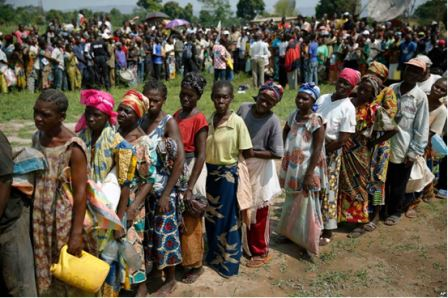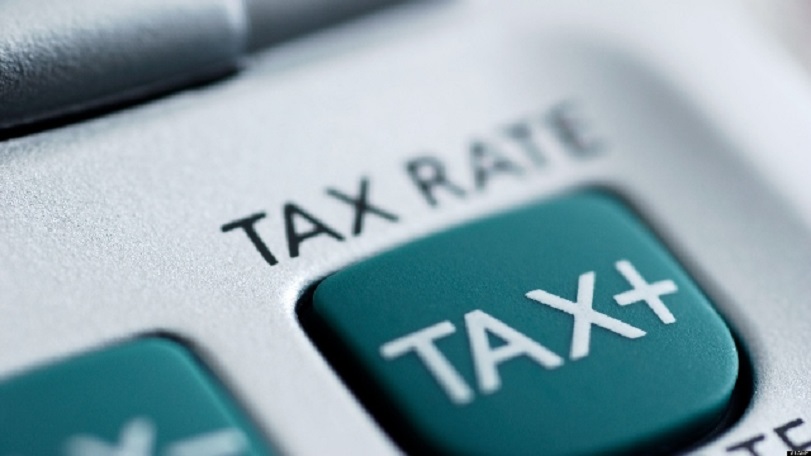General
Borno Calls TheCable’s IDP Report “Cock and Bull Story”


TheCable
Mohammed Bashir Shuwa, senior special assistant to Kashim Shettima, governor of Borno state, says TheCable’s undercover investigation on the sufferings of IDPs is a “misleading, vicious, malicious, cock and bull story”.
In November, ‘Fisayo Soyombo, multiple award-winning investigative journalist, spent eight days in Borno working undercover as a humanitarian agent, and succeeded in gaining access to public officials in charge of IDP-related matters — such as the State Emergence Management Agency (SEMA), the Civilian Joint Task Force, IDP camp officials, authentic humanitarian workers — and the IDPs themselves. TheCable published the findings on December 29, 2016.
But responding — 33 days after the story was published — Shuwa dismissed the investigation as a “hatchet assignment by a group or individuals who have rightly or wrongly an axe to grind with the state government”.
He accused TheCable of “doing anything Machiavellian not only to test the will of the administration, but undermine its integrity”, and of “going through unethical approach to cast aspersions or innuendos on the good intentions of Borno State government or any of its agencies thus bringing odium on the government, the agency or agencies concerned”.
“This is indeed the unholy mission or objective of the current story or so-called investigation of ‘The Cable’ in relation to the current happenings at the IDP camps in Borno State,” Shuwa added.
Shuwa also said it was “unfortunate that most of the pictures contained in his publication are cut and paste of over used pictures of victims who were already malnourished before their rescue by the military from the den of the insurgents and taken to IDP camps”.
However, only three of the 26 photos accompanying the story predated TheCable’s trip to the north-east.
THE FULL TEXT OF SHUWA’S REJOINDER
RE: IN BORNO CHILDREN ARE DYING IN IDP CAMPS, FOODSTUFFS ARE DISAPPEARING AT SEMA STORE BY A MOHAMMED BASHIR SHUWA, SENIOR SPECIAL ASSISTANT TO GOVERNOR KASHIM SHETTIMA, REPLIES TheCable
The above title or caption of a story or ‘investigation’ by The Cable, an on-line blog’s alleged happenings at the Internally Displaced Persons camps in Borno State is not only misleading in its entirety, but vicious, malicious, insinuating and indeed a sponsored or hatchet assignment by a group or individuals who have rightly or wrongly an axe to grind with the state governmenT.
With the assertion that a leopard does not change his colour, the concerned group or individuals having fallen from grace to grass with the state government would do anything Machiavellian not only to test the will of the administration, but undermine its integrity.
The concerned did or do through unethical approach to cast aspersions or innuendos on the good intentions of Borno State government or any of its agencies thus bringing odium on the government, the agency or agencies concerned. This is indeed the unholy mission or objective of the current story or so-called investigation of ‘The Cable’ in relation to the current happenings at the IDP camps in Borno State.
According to ‘The Cable’ investigation, the departure of Grema Terab, the immediate past Chairman of Borno State Emergency Management Agency (SEMA), the subsequent appointment of his predecessor in person of Engineer Satomi Ahmed spell down doom for the agency as the Satomi era was alleged of fraud, diversion of foodstuffs and other materials to other sources and outright stealing.
Writing under the sub-title “A TALE OF TWO SEMA CHAIRMEN” The Cable says …Grema Terab is the immediate past chairman of Borno’s SEMA… the former chairman was someone who helped everyone, whether you are IDP or not, he helped everyone but this one? He’s just hoarding all the food…”, a cock and bull story which also expose that Satomi was tried in absentia by ‘The Cable’ when it went on to state “…what manner of SEMA chairman refuses to meet potential donors, refuses to apologies for not being able to meet them, refuses to give another appointment, refuses to delegate one of his subordinates to meet them…” while they claimed being received by same SEMA officials and arranged for how they can help receive their donations when they posed as acting for some foreign donors through their Non-Governmental Organisation.
Fisayo Soyombo, the so-called Editor of ‘The Cable’ unveiled his true character as a sponsored agent with his essay or write up of contradictions, innuendos, conjectures, aspersions and outright falsehood.
It is unfortunate that most of the pictures contained in his publication are cut and paste of over used pictures of victims who were already malnourished before their rescue by the military from the den of the insurgents and taken to IDP camps. A professional and respected journalist must know that facts are sacred and comments superfluous.
Sometimes back, Governor Kashim Shettima while speaking in Abuja at a high-level Emergency Roundtable on the humanitarian crisis in the state, agreed with the submissions of the United Nations Humanitarian Co-ordinator for Nigeria, Mohammed El-Munir Safieldin who had earlier pointed out that most of the pictures of the critically malnourished infants, children and adults in circulation on social media were those of victims of recently rescued by the armed forces from Boko Haram abductors.
Governor Shettima deplored the statement by Medicines Sans Frontiers (MSF) otherwise known as Doctors Without Borders who claimed that there was acute malnutrition at IDP camp in Bama with hundreds of child deaths.
The Governor pointed out that the MSF completely ignored the fact that interventions were already being made to address the unfortunate cases of malnutrition.
While acknowledging that the situation in Borno at that time was overwhelming, Governor Shettima explained that the government with the support of a few refutable organisations was doing its best to improve the situation. Shettima argued that a situation of this nature was not peculiar to Nigeria, as displaced persons in developed nations were not without challenges.
He called for restraint and understanding as the government is doing all within its power to end the multi-dimensional problems plaguing the management of the humanitarian crisis in the region. Is the type of Fiyaso Soyombo listening?
Already the Borno State Government has deployed additional officials to various camps especially health officials to attend to the immediate and pressing needs of the internally displaced persons and report any critical situation to the ministry or department concerned.
Similarly, proactive steps are being taken to ensure that only authorised and genuine organisations with intentions favourable to the displaced persons can operate in the internally displaced camps. Besides, the state government has directed that the foodstuffs and condiments meant for internally displaced persons must never be diverted as culprits would be severely dealt with to forestall future occurrence.
In conclusion, it is advisable for the like of Fisayo Soyombo of ‘The Cable’ and his mentor or mentors that if they have nothing to say, they should not say it, here it is on record that Governor Shettima and the concerned agencies of government are doing what is humanly possible to alleviate the problems or sufferings of the internally displaced persons inspite of the limitations of the government.
We are not unaware that indeed genuine organisations and individuals are contributing in no small measure to assist the state government in this tasking assignment, just as some groups and individuals are trying to blackmail and run down the administration out of self-centredness or outright mischief.
Apart from taking several measures to minimise the hardships encountered by the displaced persons, Governor Shettima has gone ahead to relocate some to their home communities as well as relentlessly pursuing the reconstruction, rehabilitation and resettlement of the displaced persons.
Let it be known or stated that if at the end of the day, what Governor Kashim Shettima is doing is proved to be the right and just, ten thousand angels cannot hold a contrary view.
General
National Grid, Mr Ibu Among Top Trending Searches by Nigerians in 2024

By Dipo Olowookere
Many events happened in 2024 in Nigeria but a few shook the nation because of their impact on residents of the country.
According to a report released by Google, the incessant collapse of the national grip, which plunged the nation into darkness, was among trending searches on its platform.
In the report made available to Business Post on Tuesday, the tech giant said this year’s results show a continued interest in the political and economic landscape, with searches related to the US elections, the new national anthem.
“The 2024 Year in Search offers a unique lens into the questions, interests, and conversations that shaped the lives of Nigerians this year.
“From cultural milestones to pressing concerns, these insights reflect how Search continues to be a valuable tool for users to navigate and better understand their world,” the Communications and Public Affairs Manager for Google West Africa, Taiwo Kola-Ogunlade, stated.
Google’s 2024 Year in Search for Nigeria showcased the most popular searches, notable individuals, actors, musicians, topics, questions, and other subjects that captured Nigerians’ attention in the year.
Google’s Year in Search is an annual analysis that reveals the top trending lists and also spotlights what the world searches to see, learn, and do.
The music scene in 2024 was marked by a surge in popularity for artists like Shallipopi and Khaid, who also featured prominently in the overall personalities list. The top trending song was “”I Don’t Care” by Boy Spyce”, followed closely by “Ozeba” and “Commas” by Ayra”. Nigerians also showed a keen interest in understanding the lyrics of various songs, with “Ogechi lyrics”, “Ozeba lyrics”, and “Omemma by Chandler Moore lyrics” leading the searches in the lyrics category.
This year, Nigerians continued to demonstrate a strong interest in entertainment with movies like “A Tribe Called Judah”, “Treasure In The Sky”, and “Damsel” topping the movie charts. The top TV series that captured the interest of Nigerian netizens included “Supacell”, “My Demon”, and “Queen of Tears”. In the culinary world, Nigerians explored diverse recipes with “Pornstar Martini recipe” leading the searches.
Concerns about personal well-being and global events were also reflected in search trends. Questions like “How much is dollar to naira today?”, “How to get perfectly defined curls for African hair?”, and “Who won the US presidential election?” topped the list of queries. Nigerians were curious about the meaning of words like “demure,” “steeze,” and “pet peeves,” turning to Search for answers.
General
Fiscal Responsibility Commission Backs Controversial Tax Reform Bills

By Adedapo Adesanya
The Fiscal Responsibility Commission (FRC) has expressed strong support for the controversial Tax Reform Bills currently before the National Assembly.
The bills, developed by the Presidential Fiscal Policy and Tax Reforms Committee on instruction by President Bola Tinubu, aim to improve fiscal governance, transform public revenue architecture boost economic growth.
The Chairman of the commission, Mr Victor Muruako, expressed the support of the organisation at an interaction with academics and journalists on the sidelines of the Fellowship Lecture and Investiture Ceremony of the Capital Market Academics of Nigeria (CMAN) on Monday in Abuja.
According to a statement by FRC’s Head of Strategic Communications Officer, Mr Bede Anyanwu on Tuesday, the agency revealed that a critical analysis of the bills showed that it does not contain any issue or item that could be said to be skewed to favour any region or section of the country.
“The bills rather create a more equitable distribution of resources amongst Nigeria’s federating states,” Mr Muruako added, noting that the analysis also confirmed that the proposed reforms are designed to benefit all Nigerians, particularly low-income earners and Micro Small and Medium Businesses (MSMBs).
Mr Muruako outlined some of the key benefits of the reforms, including tax relief for low-income earners: individuals earning less than N1.7 million annually will pay less income tax, exemption of tax on small businesses with turnovers below N50 million, and exemption of over 90 per cent of small businesses from profit tax payment.
It was stated that the new bills intend to simplify tax administration in the country and make it more transparent.
Increasing revenue for subnational governments as states and local governments will receive a larger share of VAT revenue, empowering them to provide better public services, and improving ease of doing business, noting that reforms will reduce the administrative burden on businesses and make it easier to comply with tax regulations.
The FRC explained that it is upbeat that the tax relief for low-income earners will enhance savings and capital formation at household levels.
The commission also expressed confidence that given the positive correlation between savings and investment, explaining that the increase in small household investments across the board would lead to improvements in the sustainable growth of the nation’s economy.
He also opined that the reduced tax burden on small businesses would give Micro-Small Medium Enterprises breathing space, and enable them to grow organically, hence contributing to a sustained increase in the nation’s GDP in the near future.
On the recent controversies over the bills, Mr Muruako praised President Tinubu for allowing room for further dialogue, appealing to all stakeholders across geopolitical zones to support the bills because their transformative potentials stand to benefit every Nigerian.
General
CSCS Gets Dual Management System Certifications

By Adedapo Adesanya
Central Securities Clearing System (CSCS) Plc has been awarded the ISO/IEC 27001:2022 and ISO 22301:2019 certifications by the globally renowned Management System Certification Body (MSECB).
According to a statement from the firm, the Managing Director of CSCS, Mr Haruna Jalo-Waziri, said the ISO 27001 is an internationally recognised benchmark for managing information security, ensuring robust protection against data breaches and IT disruptions.
The ISO 22301 standard is an international standard that establishes the requirements for business continuity management systems.
Mr Jalo-Waziri said this recognition underscores CSCS’s steadfast commitment to international best practices in information security management and business continuity.
He noted that the ISO/IEC 27001:2022 certification highlights CSCS’s adherence to stringent information security measures, ensuring robust protection against data breaches and IT disruptions.
Mr Jalo-Waziri said that the ISO 22301:2019 certification also confirms CSCS’s business continuity and readiness to respond to unexpected incidents, minimising disruptions and safeguarding stakeholders’ interests.
“Achieving these certifications is a testament to our deliberate and strategic focus on embedding a culture of excellence, resilience, and trustworthiness in our operations.
“It underscores our commitment to maintaining the highest standards of information security and business continuity in delivering value to our stakeholders.
“These certifications position CSCS alongside leading global organisations that prioritise the confidentiality, integrity, and availability of information systems.
“They further validate the organisation’s dedication to securing its clients’ trust and ensuring operational resilience,” he said.
The CSCS MD added these certifications not only reinforce the trust of its clients, stakeholders, and regulators but also to validate the hard work and dedication of its team.
He said, that as Nigeria’s premier financial market infrastructure, the firm remains resolute in its mission to enable market confidence through best-in-class services and practices.
According to him, receiving these certifications from MSECB strengthens CSCS’s reputation as a reliable partner and a leader in the financial market ecosystem.
He said that the certifications assure stakeholders that CSCS’s processes are periodically monitored to meet and exceed compliance requirements.
This achievement, Mr Jalo-Waziri said, was a significant milestone in CSCS’s journey to consistently deliver secure, resilient, and innovative solutions to the Nigerian capital market and beyond.
-

 Feature/OPED5 years ago
Feature/OPED5 years agoDavos was Different this year
-
Travel/Tourism8 years ago
Lagos Seals Western Lodge Hotel In Ikorodu
-

 Showbiz2 years ago
Showbiz2 years agoEstranged Lover Releases Videos of Empress Njamah Bathing
-

 Banking6 years ago
Banking6 years agoSort Codes of GTBank Branches in Nigeria
-

 Economy2 years ago
Economy2 years agoSubsidy Removal: CNG at N130 Per Litre Cheaper Than Petrol—IPMAN
-

 Banking2 years ago
Banking2 years agoFirst Bank Announces Planned Downtime
-

 Sports2 years ago
Sports2 years agoHighest Paid Nigerian Footballer – How Much Do Nigerian Footballers Earn
-

 Technology4 years ago
Technology4 years agoHow To Link Your MTN, Airtel, Glo, 9mobile Lines to NIN
















